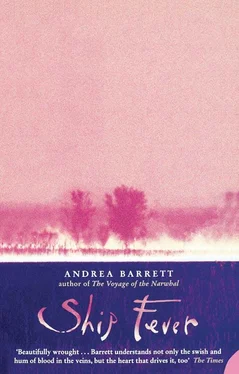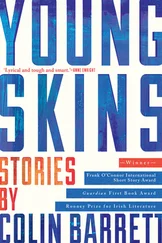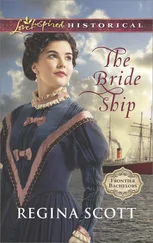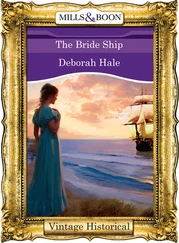Is it possible?
Eight months later, Sarah Anne and Christopher stand on London Bridge with Miss Juliet Colden and her brother John, all of them wrapped in enormous cloaks and shivering despite these. They’ve come to gaze at the river, which in this January of remarkable cold is covered with great floes of ice. An odd way, Sarah Anne thinks, to mark the announcement of Christopher and Juliet’s engagement. She wishes she liked Juliet better. Already they’ve been thrown a great deal into each other’s company; soon they’ll be sharing a house.
But not sharing, not really. After the wedding, Juliet will have the household keys; Juliet will be in charge of the servants. Juliet will order the meals, the flowers, the servants’ livery, the evening entertainments. And Sarah Anne will be the extra woman.
The pieces of ice make a grinding noise as they crash against each other and the bridge. Although the tall brick houses that crowded the bridge in Sarah Anne’s childhood were pulled down several years ago and no longer hang precariously over the water, the view remains the same: downriver the Tower and a forest of masts; upriver the Abbey and Somerset House. The floating ice greatly menaces the thousands of ships waiting to be unloaded in the Pool. It is of this that John and Christopher speak. Manly talk: will ships be lost, fortunes destroyed? Meanwhile Juliet chatters and Sarah Anne is silent, scanning the sky for birds.
Wrynecks, white-throats, nightingales, cuckoos, willow-wrens, goatsuckers — none of these are visible, they’ve disappeared for the winter. The swallows are gone as well. An acquaintance of Christopher’s mentioned over a recent dinner that on a remarkably warm December day, he’d seen a small group of swallows huddled under the moldings of a window at Merton College. What were they doing there? She’s seen them, as late as October, gathered in great crowds in the osier-beds along the river — very late for young birds attempting to fly past the equator. In early May she’s seen them clustered on the largest willow at Burdem Place, which hangs over the lake. And in summer swallows swarm the banks of the Thames below this very bridge. It’s clear that they’re attached to water, but attachment doesn’t necessarily imply habitation. Is it possible that they are still around, either below the water or buried somehow in the banks?
If she were alone, and not dressed in these burdensome clothes, and if there were some way she could slip down one of the sets of stairs to the river bank without arousing everyone’s attention, she knows what she would do. She’d mark out a section of bank where the nesting holes are thickest and survey each hole, poking down the burrows until she found the old nests. In the burrows along the river bank at home she’s seen these: a base of straw, then finer grass lined with a little down. Small white eggs in early summer. Now, were she able to look, she believes she’d find only twists of tired grass.
The wind blows her hood over her face. As soon as she gets home, she thinks, she’ll write another letter to Linnaeus and propose that he investigate burrows in Sweden. Four times she’s written him, this past summer and fall; not once has he answered.
Christopher and John’s discussion has shifted to politics, and she would like to join them. But she must talk to Juliet, whose delicate nose has reddened. Juliet’s hands are buried in a huge fur muff; her face is buried in her hood. Well-mannered, she refuses to complain of the cold.
“You’ll be part of the wedding, of course,” Juliet says, and then she describes the music she hopes to have played, the feast that will follow the ceremony. “A big table,” she says. “On the lawn outside the library, when the roses are in bloom — what is that giant vine winding up the porch there?”
“Honeysuckle,” Sarah Anne says gloomily. “The scent is lovely.”
She can picture the wedding only too clearly. The other attendants will be Juliet’s sisters, all three as dainty and pretty as Juliet. Their gowns will be pink or yellow or pink and yellow, with bows down the bodice and too many flounces. The couple will go to Venice and Paris and Rome and when they return they’ll move into Sarah Anne’s large sunny bedroom and she’ll move to a smaller room in the north wing. The first time Juliet saw Sarah Anne’s room, her eyes lit with greed and pleasure. A few days later Christopher said to Sarah Anne, “About your room…” She offered it before he had to ask.
“Christopher and I thought you’d like the dressing table your mother used,” Juliet says. “For that lovely bay in your new room.”
But just then, just when Sarah Anne thinks she can’t bear another minute, along comes another of her dead father’s elderly friends, accompanied by a woman. Introductions are made all around. Mr. Hill, Mrs. Pearce. Sarah Anne has always enjoyed Mr. Hill, who is livelier than his contemporaries, but he is taken away. The group splits naturally into two as they begin their walk back to the Strand. Mr. Hill joins Christopher and John, and Mrs. Pearce joins Sarah Anne and Juliet. But Mrs. Pearce, instead of responding to Juliet’s remarks about the weather, turns to Sarah Anne and says, “You were studying the riverbank so intently when Mr. Hill pointed you out to me. What were you looking for?”
Her face is lean and intelligent; her eyes are full of curiosity. “Birds,” Sarah Anne says impulsively. “I was looking for swallows’ nests. Some people contend that swallows spend the winter hibernating either under water or in their summer burrows.”
She explains the signs that mislead observers, the mistaken stories that multiply. At Burdem Place, she says, she heard a friend of her brother’s claim that, as a boy, he found two or three swallows in the rubble of a church-tower being torn down. The birds were torpid, appearing dead, but revived when placed near a fire. Unfortunately they were then accidentally roasted.
“Roasted?” Mrs. Pearce says with a smile.
“Crisp as chickens,” Sarah Anne says. “So of course they were lost as evidence. But I suppose it’s more likely that they overwinter in holes or burrows, than that they should hibernate under water.”
“Some people read omens in the movements of swallows,” Mrs. Pearce says. “Even Shakespeare — remember this? ‘Swallows have built in Cleopatra’s sails their nests. The augeries say they know not, they cannot tell, look grimly, and dare not speak their knowledge.’ Poetic. But surely we’re not meant to believe it literally.”
Sarah Anne stares. There’s nothing visibly outrageous about Mrs. Pearce. Her clothing is simple and unfashionable but modest; her hair is dressed rather low but not impossibly so. “I believe that one should experiment,” Sarah Anne says. “That we should base our statements on evidence.”
“I always prefer to test hypotheses for myself,” Mrs. Pearce says quietly.
Juliet is pouting, but Sarah Anne ignores her. She quotes Montaigne and Mrs. Pearce responds with a passage from Fontenelle’s Entretiens sur la pluralité des mondes. “Do you know Mrs. Behn’s translation?” Sarah Anne asks. At that moment she believes in a plurality of worlds as she never has before.
“Of course,” says Mrs. Pearce. “Lovely, but I prefer the original.”
Sarah Anne mentions the shells that she and Christopher have inherited from Sir Hans Sloane’s collection, and Mrs. Pearce talks about her collection of mosses and fungi. And when Sarah Anne returns to the swallows and says that Linnaeus’s belief in their watery winters derives from Aristotle, Mrs. Pearce says, “When I was younger, I translated several books of the Historia Animalium. ”
Sarah Anne nearly weeps with excitement and pleasure. How learned this woman is. “How were you educated?” she asks.
Читать дальше
Конец ознакомительного отрывка
Купить книгу












